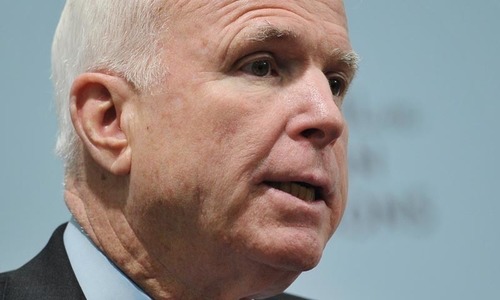Bills suggesting curbs on US assistance to Pakistan okayed

WASHINGTON: The US House of Representatives passed on Friday a sweeping $696 billion defence policy bill that would exceed President Donald Trump’s budget request and break through longstanding caps on national defence spending.
The bill adopted decisively by 344 to 81 votes includes provisions for tightening restrictions on US assistance to Pakistan.
Late on Thursday, another congressional panel approved by voice vote the State and Foreign Operations bill that also suggests increased restrictions on US civil and military assistance to Pakistan. The foreign affairs bill now goes to the full House for voting.
Examine: Pakistan’s anxiety
The defence bill authorises $696bn in defence spending for the 2018 fiscal year, including nearly $30bn more for core Pentagon operations than President Donald Trump requested.
All but eight Republicans and 117 Democrats voted for the bill, which surpasses the $549bn cap on defence spending set under the 2011 Budget Control Act by about $72bn.
The other legislation, however, would reduce funding for the State Department and foreign operations by $10bn, down from about $57.4bn in fiscal 2017. Still, the cuts are not as deep as those in the Trump administration’s budget proposal, which included roughly $37bn for the state.
In total, the bill provides $47.4bn in both regular discretionary and Overseas Contingency Operations (OCO) funding. This total is $10bn below the fiscal year 2017 enacted level, when counting additional funds provided in the Security Assistance Appropriations Act of 2017.
Within this amount, OCO funding totals $12bn, which supports operations and assistance in areas of conflict, such as Iraq, Afghanistan and Pakistan.
The text of the bill, released earlier this week, includes provisions to make the civil and military aid to Pakistan conditional to Islamabad stopping its alleged support to the Haqqani network and other militant groups in the South Asian regions.
Although the text focuses on the groups that fight US and official Afghan forces in Afghanistan, some groups named in the text also operate in the Indian occupied Kashmir.
In recent days, senior US officials and lawmakers have both sent clear messages to Pakistan, urging it to help the United States and the Afghan government defeat the Taliban militants. They also said that the failure to do so would force the United States to reconsider its relationship with Pakistan.
US officials and lawmakers, however, have left open the option to hold peace talks with the Taliban.
In April, US Secretary of State Rex W. Tillerson told America’s Nato allies in Brussels that an eventual settlement between the Afghan government and the Taliban is the ultimate goal of the Trump administration.
“The ongoing commitment of Nato allies and partners to peace in Afghanistan, including to an eventual settlement between the Afghan government and the Taliban, protects this alliance’s interests, and, when successful, ensures that Afghanistan never again becomes a safe haven for terrorists,” he said.
Although in power since Jan 20, the Trump administration is still finalising a policy for the Pak-Afghan region and recent leaks to the media indicate that while the new strategy would suggest both “qualitative and numerical” increase in US military presence in Afghanistan, it will also continue to seek a negotiated settlement to the Afghan conflict.
At a recent news briefing, State Department Spokesperson Heather Nauert avoided categorising the Taliban as a terrorist outfit.
“Our Afghan policy review is still under way. That has not been announced just yet,” said Ms Nauert when asked if the Trump administration is going to brand the Taliban as terrorists.
Published in Dawn, July 15th, 2017













































